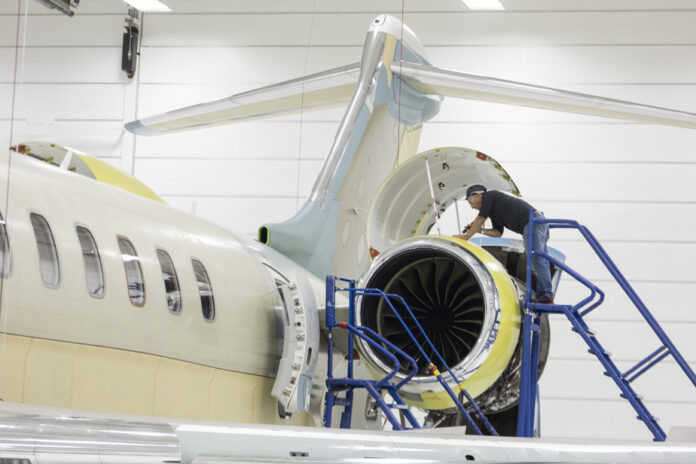Bombardier maintains the course on the side of private jet deliveries despite the disruptions at suppliers in the industry. This is not the case at Gulfstream and Textron, two of its main rivals. The aircraft manufacturer believes it is reaping the benefits of its efforts since the start of the pandemic.
“We were probably the first to react three years ago,” Bombardier President and CEO Eric Martel said during a conference call on Thursday to comment on the first quarter results. I believe we are reaping the benefits. We are probably facing the same type of challenges as them (our competitors). »
The latter spoke to the media ahead of the company’s annual meeting, which ended late Thursday morning.
The Quebec business jet manufacturer exceeded analysts’ expectations by returning to profitability in the first quarter that ended on March 31. Bombardier handed over 22 aircraft to customers in the first three months of the year, one more than a year ago. The company has, however, delivered more Challenger and Global – more expensive devices with higher margins. This reflected on its profitability.
At General Dynamics, owner of Gulfstream, and Textron, manufacturer of Cessna and Beechcraft, the opposite has happened. Deliveries contacted by 16% (4 units), to 21 aircraft, at General Dynamics. As for Textron, which also unveiled its first quarter results on Thursday, deliveries stood at 35 units, down 10% (4 private jets).
“This is the first quarter in which we have missed an aircraft delivery due to supply chain issues,” General Dynamics CEO Phebe Novakovic said Wednesday in a conference call. with financial analysts. So far, we had been able to avoid delays. »
As of 2021, Bombardier had notably deployed its own employees – specialized in logistics and purchasing – to certain second and third tier suppliers in order to support them. The objective is to quickly be informed of glitches. The strategy seems to be working.
The Quebec aircraft manufacturer still expects to deliver at least 138 private jets this year. In 2022, they had amounted to 123 units.
“We delivered exactly the number of planes that we expected (in the first quarter) said Mr. Martel. Our plan takes supply chain issues into account. »
Nevertheless, some analysts expected to see more devices leaving the company’s factories. Benoit Poirier, at Desjardins Securities, expected 24 deliveries, while Cameron Doerksen, at National Bank Financial, anticipated 26.
Business aviation has shattered records since the start of the health crisis as the ultra-rich and the wealthiest have turned to private transport to get around. But that is changing, warns WingX. In a report published Thursday, the firm observes that the gap between the current level of activity compared to that observed in 2019 – before the appearance of COVID-19 – is narrowing.
Added to this are recession fears and the recent banking crisis in the United States caused by the collapse of Silicon Valley Bank – a regional financial institution. This had an impact on orders.
“We sensed customer hesitation for two or three weeks in mid-March,” Martel said. Since that time, business has returned to normal. »
In the first quarter, the ratio of new orders to the number of deliveries was 0.9. This means that Bombardier has won enough new contracts to allow its order book to remain stable. Its value is estimated at 14.8 billion US. Bombardier estimates that this represents approximately two years of work.
“We are reassured to see that the backlog has been stable despite the economic volatility,” Doerksen said in a note to clients. It is also reassuring to note that Bombardier management foresees new orders in the second quarter. »
Despite the presentation of results that exceeded analysts’ expectations in terms of revenue and adjusted earnings per share, investors reacted negatively on Thursday. In the afternoon, on the Toronto Stock Exchange, Bombardier shares fell 5.6%, or $3.62, to trade at $60.92. In 2022, the company had carried out a reverse stock split at a ratio of 25 to 1.
Unlike other companies established in Quebec, such as National Bank, Quebecor, SNC-Lavalin and Canadian National, Bombardier will not disclose the languages spoken by the members of its board of directors. Following his recommendation, the shareholders of the aircraft manufacturer rejected the proposal of the Movement for the Education and Defense of Shareholders (MÉDAC). At the time of this writing, the outcome of the vote was not yet known. “We respect language laws everywhere,” Mr. Martel said before the annual meeting. I think that it is our actions rather than gestures that I would describe as symbolic that we demonstrate the importance we give to French. Bilingual, the boss of the company pointed out that six of the 13 administrators master the language of Molière. Nonetheless, MÉDAC director Willie Gagnon said he was “bitterly disappointed” with Bombardier’s response. “It’s a simple gesture that costs nothing,” he lamented.





